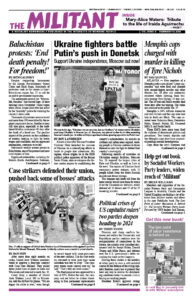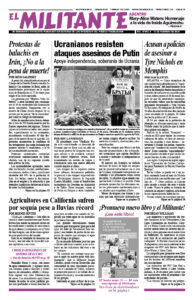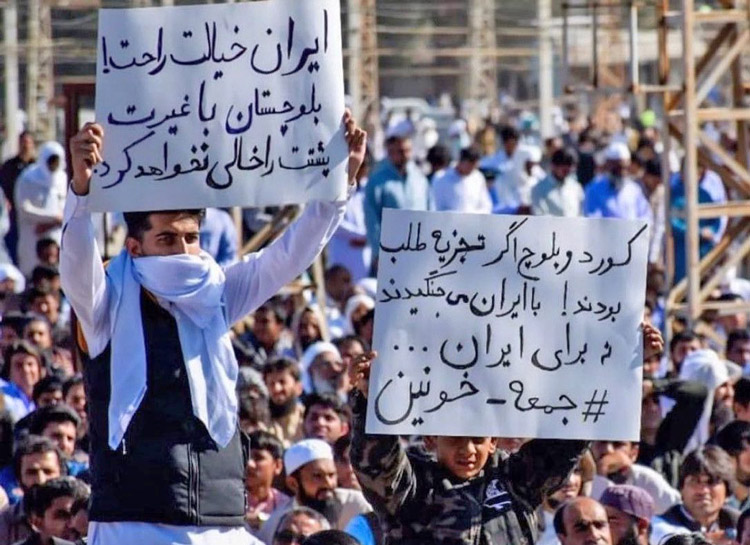Despite stepped-up harassment by the Islamic Revolutionary Guard Corps and Basij thugs, thousands of protesters took to the streets in Iran’s Baluchistan region Jan. 27 to call for an end to government repression.
The nationwide protests for “Women, life, freedom” that started Sept. 16 have declined since November. These began when Zhina Amini died after her arrest by the “morality” police for violating the country’s dress code.
Thousands of protesters were arrested and more than 500 were killed by the regime’s repressive forces. Smaller actions still take place, especially at the traditional Muslim ceremonies 40 days after the death of a loved one. The positive impact of the protests on the confidence of workers looking to fight for better wages and conditions, and on oppressed nationalities, continues to be felt.
Substantial weekly actions persist in Baluchistan, one of the poorest and most rural regions of Iran.
Oppressed nationalities, including the Baluch, Kurds, Azerbaijanis, Turkmen, Arabs and Lurs, make up some 40% of the population. Their struggles against discrimination in jobs and education and for language rights strengthen the fight of all working people.
The Shiite-based clerical regime’s fear of their struggles is behind the arrests of clerics of the mostly Sunni Baluch, Kurds and Turkmen. Many Sunni clerics have voiced support for the protests. On Jan. 25, Saifullah Hosseini, a Sunni cleric in Kurdistan, was sentenced to 17 years in prison.
Prominent Sunni cleric Maulana Abdul-Hamid, who is based in Zahedan, uses his weekly Friday sermons to speak out against the regime’s crackdown and to call for unity among all nationalities and religions.
In Zahedan, capital of Sistan-Baluchistan province, a prominent banner at the Jan. 27 march read, “Neither monarchy nor a Supreme Leader. We want equality, democracy.” Despite the arrest of some protesters, the march went ahead. The banner is a response to claims by the regime in Tehran that protesters want to return to the days of the U.S.-backed shah, who was overthrown in the 1979 revolution, as well as to monarchists today who seek to pretty up his brutal rule.
Consolidation of counterrevolution
Leaders of the Islamic Republic portray themselves as the defenders of the revolution. But as soon as the shah was overthrown, supporters of Ayatollah Ruhollah Khomeini began trying to push back gains made by working people during that gigantic struggle. They wanted to prevent workers from organizing shoras — councils — in factories and neighborhoods to advance their own interests. They tried to block farmers from demanding land reform.
Club-wielding goons attacked workers’ organizations and the Islamists’ bourgeois rivals, breaking up meetings and closing down offices.
In 1982-83, the Islamic Revolutionary Guard Corps and Basij paramilitary thugs became key weapons in the consolidation of that counterrevolution.
Today the Revolutionary Guard plays a key role in the regime’s drive to spread its counterrevolutionary influence across Iraq, Lebanon, and Syria.
In his Jan. 27 remarks, Abdul-Hamid noted that not only do people in Iran want freedom for political prisoners, equal rights for women and the end of discrimination against oppressed minorities, they also “want Iran to be a peaceful country.”
He said that “the government of Israel and the Palestinian people should make peace,” adding that both Israel and Palestine should have their own government.
This is in sharp contrast to the calls by central leaders of the Islamic Republic for the destruction of Israel. The pro-regime press ran articles saluting the Jan. 27 massacre of seven Jews outside a synagogue in Jerusalem by a Palestinian gunman.
The Sunni leader also called for the formation of an “all-inclusive government” in Yemen to end a war that has led to the deaths of more than 150,000 people and widespread famine. The Iranian rulers intervene there by arming Houthi militias that are at war with forces backed by the Saudi monarchy.
The deadly consequences of the regime’s military incursions are felt especially hard in the Baluchistan region, which is home to many refugees from the war in Afghanistan. Tehran has “recruited” thousands of Afghan refugees to join militias it controls in Syria and Iraq to extend its influence.
Four protesters have been executed since December. Abdul-Hamid denounces the use of the death penalty in Iran and “anywhere in the world.”
Executions accelerated after the election of Ebrahim Raisi as president in 2021. That year at least 314 prisoners were executed, overwhelmingly workers. More than 20% were Baluch — even though they make up about 5% of the population — and more than 18% were Kurds, who form about 10%.


